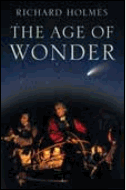|
|
|
|
|
|
|
News & Views item - September 2009 |
![]() Richard Holmes' The Age of Wonder Wins Royal Society Book Prize.
(September 16, 2009)
Richard Holmes' The Age of Wonder Wins Royal Society Book Prize.
(September 16, 2009)
 The
Royal Society yesterday awarded its 2009 prize for the best book on a scientific
subject to Richard Holmes, Professor of Biographical Studies at the University
of East Anglia.
The
Royal Society yesterday awarded its 2009 prize for the best book on a scientific
subject to Richard Holmes, Professor of Biographical Studies at the University
of East Anglia.
The £10,000 prize was given for The Age of Wonder which is subtitled How the romantic generation discovered the beauty and terror of science.
In its announcement the Royal Society said the book was: "inspired by the scientific ferment that swept through Britain at the end of the eighteenth century, and which Holmes now radically redefines as 'the revolution of Romantic Science'. [It] investigates the fascination [by] using the stories of the scientists involved to engage the reader. The book covers a variety of disciplines including astronomy, chemistry, botany, philosophy, and even poetry, as it explores how the science of the time evolved."
But the two figures who dominate the book are "astronomer William Herschel and chemist Humphry Davy. Herschel's tireless dedication to the stars, assisted (and perhaps rivalled) by his comet-finding sister Caroline, changed forever the public conception of the solar system, the Milky Way galaxy and the meaning of the universe itself [while] Davy first shocked the scientific community with his near-suicidal gas experiments in Bristol, then went on to save thousands of lives with his Safety Lamp and established British chemistry as the leading professional science in Europe.
"Holmes proposes a radical vision of science before Darwin, exploring the earliest ideas of deep time and deep space, the creative rivalry with the French scientific establishment, and the startling impact of discovery on great writers and poets such as Mary Shelley, Coleridge, Byron and Keats. With his trademark sense of the human drama, he shows how great ideas and experiments are born out of lonely passion, how scientific discoveries (and errors) are made, how intense relationships are forged and broken by research, and how religious faith and scientific truth collide. The result is breathtaking in its originality, its story-telling energy, and not least, in its intellectual significance for the contemporary reader."
Sir Tim Hunt FRS, Chair of the judges said: "This is a book about real heroes, scientists like Joseph Banks, Humphrey Davy and William Herschel, who changed our understanding of the world forever. It's extremely accessible, wearing its science lightly while placing it within a much wider cultural context. We all found it a wonderful, eclectic and compelling read, completely absorbing, romantic and original. An extraordinary achievement and a truly worthy winner."
Professor Holmes when asked, during a panel discussion which preceded the awarding of the prize, who was his favourite character in his book said: "Caroline Herschel is my heroine".
The six books shortlisted were:
What the nose knows: The science of scent in everyday life by Avery Gilbert (Crown Publishers)
Bad science by Ben Goldacre (Fourth Estate)
Decoding the heavens: Solving the mystery of the world's first computer by Jo Marchant (Windmill)
The age of wonder: How the Romantic generation discovered the beauty and terror of science by Richard Holmes (Harper)
The drunkard's walk: How randomness rules our lives by Leonard Mlodinow (Penguin)
Your inner fish: The amazing discovery of our 375-million-year-old ancestor by Neil Shubin (Penguin)